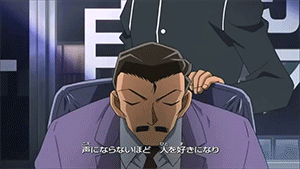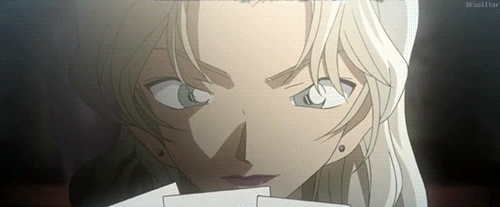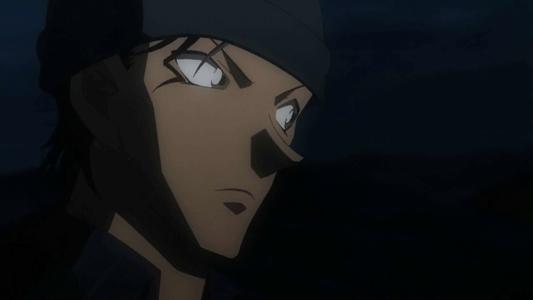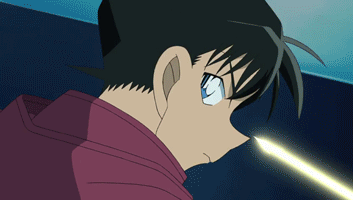There were a couple points after the Vermouth arc finale that people thought would be the beginning of the end for DC (either when they first heard that such a story was happening or during it):Kudo Shinchi wrote:While I've generally enjoyed how the story played out, Gosho didn't have to do it the way he did. He could have hypothetically, after the Vermouth arc, constructed a penultimate arc where the boss's phone number set off events that would have hurtled the series towards a final confrontation. This arc could have established whatever the Kir arc did about Akai's character and directly continued the mysteries brought up in the Vermouth arc, followed by the final arc where the series finally concludes. DC could have realistically been over by now if that's the path that Gosho chose to take.
...someone could argue that Gosho should have written the end of the Kir arc differently so that it led into the final arc. After all, now that the FBI and the CIA were established as Conan's allies, we could get down to business (and I'm sure many thought that Clash of Red and Black was a sign that the end was near). And sure, that might have been possible.
Clash of Red and Black (585–590, 595–609/491–504)
Holmes' Revelation (743–752/616–621)
Mystery Train (818–824/701–704)
Scarlet Showdown (894–898/781–783)
I think people started to be less surprised after every BO confrontation that didn't seem to lead directly to a series climax and finale, but Shinichi's confession? Such an event, in the longest case in DC history, not leading to the end, I think, was the most surprising.
Also, if Gosho had something as far along in the series as the Rum arc and Mary planned out from the start, he could've merged a bunch of the plot cases with the pure mystery cases, and introduced a bunch of important characters much earlier than they actually were—this would've reduced the series in length by a bunch. For instance, we could've been where we are right now in the story nearly ten years ago, or even further (depending on how much merging and cutting there would be). Characters like Hidemi/Rena/Kir and Shuichi could've been introduced in the first 175 files (Intro/Conan arc), characters like Naeko could've been introduced during the Sherry/Haibara arc (176–237/129–175) and their romances addressed in the Vermouth arc (including Ninzaburo and Sumiko getting together after the former nearly married Miwako, for instance; Sumiko was introduced before most of the police characters, other than Juzo, Kiyonaga, and Sango, and the resemblance between her and Miwako was apparent from the get-go). So, conceivably, we could've reached a point where DC seemed to be winding down around the time of the Kir arc (November 2004–September 2007).
I'd say that Shinichi/Conan and the FBI not being partners in the Vermouth arc is what led to Vermouth getting away, so until they did, I really don't think Shinichi/Conan could've taken on the BO without them. Look at his encounter with Gin and Vodka after Itakura's death (380–383/309–311)—the only reason he got out of that was because Gin assumed the one after them wasn't a midget (adult short as a kid). Having the FBI, a CIA agent and an NPA Security Bureau Agent on allied terms is an immense improvement for his chances in taking the BO down.Kudo Shinchi wrote:However, ultimately I think that what Gosho has done with the story feels natural and organic, even if the pacing was sometimes a little too slow (see the one and half year of no plot mid-Bourbon arc, although in retrospect that's likely when Gosho planned everything that we've seen unfold over the past four years).The way I see it is, while the end of the Vermouth arc/cellphone arc might have appeared to signal that the end was near, it was still far too early for Conan to realistically take down the BO. At that point in time, the only allies he had were Haibara, Heiji, Agasa, and his parents, more or less. That isn't a team that could realistically take down a massive international crime syndicate. The introduction of agencies like the CIA and the FBI was basically a must, so that Conan could have actual qualified allies with the tools, information, and ability to plausibly confront the BO. The Vermouth arc did the work of introducing the FBI agents, but by the end of it they and Conan were far from allies; heck, Akai thought Conan was an "annoying" kid. The Kir arc was immensely important for establishing the partnership between Conan and the FBI, and while Gosho was at it he threw in the CIA, which provided Conan with more allies while also emphasizing just how epic the struggle against the BO was (as MeiTantei mentioned above). And, as already mentioned, it was when the two Silver Bullets of DC actually united and became allies.
One would expect just the CIA to be involved in something like this, but the FBI being there means that the BO really has the attention of the U.S. intelligence community. The PSB of Tokyo Metro PD (Scotch) and the Security Bureau of the NPA (Rei/Tooru) are aware of the BO, as well. Beyond these four agencies, we don't know which other agencies are aware of the BO.
Again, the second one could've happened earlier in DC, but it happened during the Bourbon arc, after Wataru and Miwako first kissed, so I suppose Gosho considered that more appropriate.Kudo Shinchi wrote:However, this neglects another point, I think: BO plot progression does not constitute all of DC. If anything, Gosho seems to treat the romance subplots of the series as just as important as the BO plot, regardless of whether people like then or not. So, to get a good sense of how close to the end we were, it would be a good idea to look to how far the romance plots had progressed. The Bourbon arc did serious heavy-lifting in this area. Consider, that in its duration:
-Takagi and Sato became an official couple on a first-name basis with each other, with Takagi considering marriage
-Shiratori and Takagi's rivalry, one that predated even the Vermouth arc, finally ended, with Shiratori finding his own partner
-Shinichi confessed to Ran
-Hattori kind-of confessed to Kazuha
That's important progress for the main three couples of the series, and the way I think of it, as strong a sign for an approaching end as any plot development.
The fact that Gosho has really put the after-effects of the third on hold likely means that said after-effects will lead to a major change (final suspicion arc, most likely).
Heiji is no longer dense—in his last appearance, he was pretty much ready to confess in an unremarkable place (931–935). Kazuha also showed herself ready to confess, albeit under certain circumstances (781–786/652–655). My favorite scenario for confession between them is a case in Paris, with Kid involved (and him disguising as Kazuha, since she's one of the only characters he hasn't disguised as), or a case with Kid at a landmark locale in Japan.
So, in terms of romance, in the Bourbon arc, we've either had resolutions or big developments that will likely lead to resolutions.
Yes—just because something continues to remain unresolved doesn't mean it's pointless. And is it just me, or does no one seem to notice that the Sherry hunt (176–824/129–704) ended during the Bourbon arc (at least, for now, potentially)? That was a really long BO plot thread.Kudo Shinchi wrote:Besides this, all sorts of arguments can be made for the Bourbon arc's important contributions, including laying an arc-long foundation for Ran's next (and probably final) suspicion arc, starting subtly with the Shinigami case and becoming progressively more explicit (look no further than Yuusaku's Cold Case). It is kind of hard to argue this point too strongly since so many of the Bourbon arc's mysteries have yet to be resolved, and unlike the still unresolved mysteries of the Vermouth arc, their relevance to the plot is not immediately obvious (though as I said before, this isn't grounds to assume that they are pointless). Stuff like the purpose of Shiho's fake death is unclear, but somehow I doubt that Gosho ended the Sherry hunt (a major development in and of itself) for no reason; and, if he did, that's that: the Sherry hunt is over, and that part of the plot can be concluded. I guess my point is that I just don't understand the thinking that says "Amuro is yet another spy" = "pointless seven years." I will concede that the Bourbon arc really was far too long; seven years is just excessive on any level, and even all of its relevant development can't justify its length.
I think some thought there were too many similarities between elements of the Bourbon arc and elements of both the Vermouth (disguises) and Kir arcs (involvement of the family of government agent; character arc is named after is a spy), that the execution was inferior to that of those two arcs—especially the former—and that between 6 and 2/3rds years and 6 and 3/4ths years was not an acceptable length, considering the former two charges.
True—with some cutting and merging, Scarlet Showdown, and the arc, itself, could've ended in October 2011 (when Rei/Tooru made his official debut).
Vermouth was the boss' favorite—the next two arcs were about codenamed members of lesser rank than she, especially as far as Hidemi/Rena/Kir is concerned, though Rei/Tooru/Bourbon seems to have been able to blackmail her effectively. Maybe the next arc will be about Gin, and will finally answer the questions we've all been asking about him, and then the Boss arc will wrap everything up.Kudo Shinchi wrote:Since Rum is the second-in-command, it might finally be pretty plausible to say the end is near, as we are likely in the arc before the last; I don't think it'd make much narrative sense to go from having the BO's number 2 be an arc's primary threat to a lesser member. The next logical step after this is the boss himself.
And, just so this post is actually on topic in some shape or form, I wonder what's up with Kuroda. He kind of seems to have been forgotten in the midst of all this Kouji and Asaka stuff.
Hyoue hasn't appeared since the two cases that came out from December 2014 to March 2015 (913–920; Kawanakajima and Selfie Stick Murder), and hasn't even been mentioned since the beginning of the case that marked Gosho's return from ill health in July 2015 (925). Considering the current case, throwing him into the mix would be interesting... I'm still pretty sure that Hyoue Kuroda pre-coma and Hyoue Kuroda post-coma are not the same person (though getting background info about and even flashbacks to his past would help in finding out whether I'm falling for a red herring or not).






